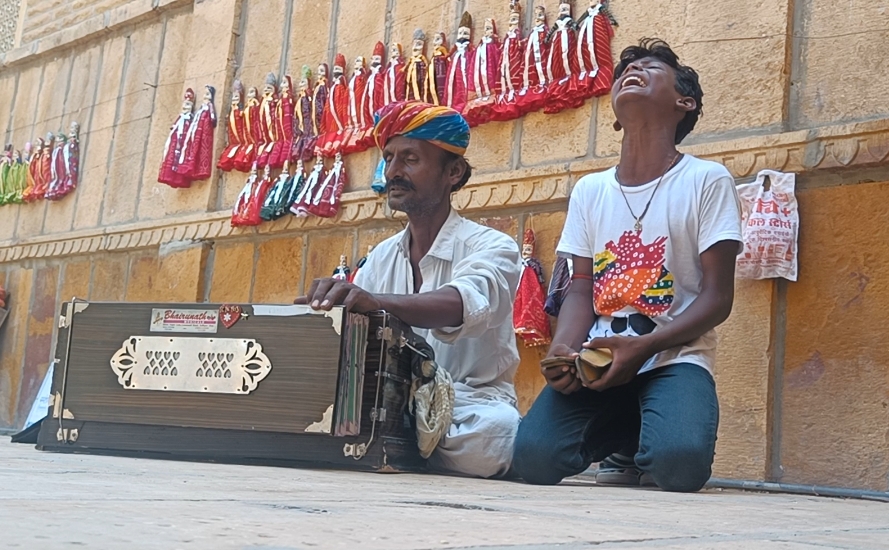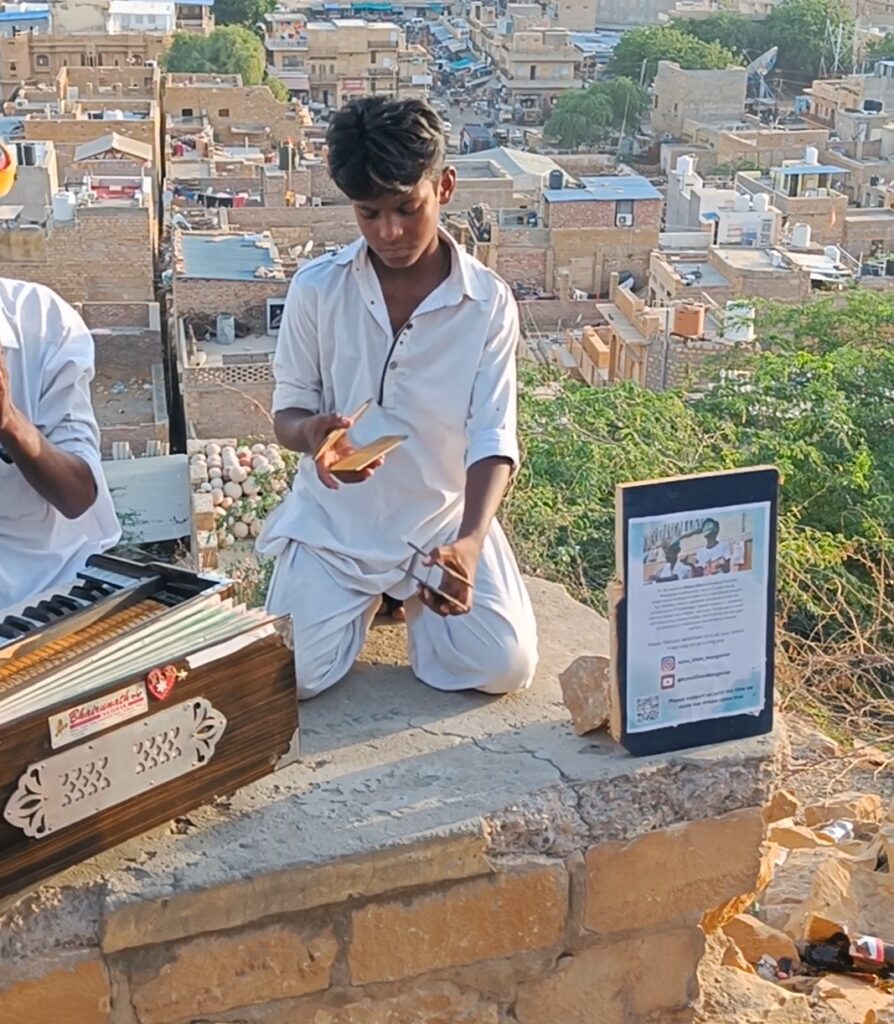How is the life of Manganiyar community people who sing folk and Sufi music in Rajhasthan?
Rajasthan, one of the Indian states, grapples with underdevelopment in many areas, where people continue to uphold ancient traditions passed down through generations. It’s common to observe professions being inherited, like a blacksmith’s son following in his father’s footsteps or a teacher’s son becoming a teacher. Among these communities is the Manganiar class, part of the Muslim community, known for their folk music. They’ve been performing for wealthy landlords and aristocrats for generations, and music is deeply ingrained in their culture, with newborns’ cries eagerly awaited to check if they have a natural rhythm.
In this community, women typically don’t participate in singing performances, so male children are highly prized as they’re seen as the means to sustain their families. To this day, many of these community members sing on the streets to make a living.
During my all-India cycling tour, I had the privilege of meeting Mr. Sattar Khan, a member of this community, and his 13-year-old son, Khanu Khan. They perform at Jaisalmer’s sunset point to earn donations from visitors. Conversations with them provided valuable insights into their mindset and the challenges they face in making a livelihood through street performances.

The life of Manganiyar community people
Mr. Sattar Khan vividly recounted how Jaisalmer has transformed over the years, now attracting hordes of tourists to its golden landscape. He painted a stark picture of his childhood, describing how his mother would endure long walks under the scorching desert sun just to fetch a single bucket of water for her children. Raised in abject poverty, he explained that their survival hinged on mastering music as children and performing for the affluent during various occasions to eke out a living. On days when their musical talents weren’t in demand, they resorted to seeking sustenance from the homes of wealthy landlords, a different form of begging, as he put it.
Sattar Khan shared that he began singing at the age of 11, accompanying his father to sing in order to earn enough for the day. Hailing from a family of 5 brothers and 2 sisters, all reliant on singing for their livelihood, he shed light on the prevalent practice of early marriages within their community. In 2003, at the tender age of 20, he became a married man. In addition to their musical pursuits, they also engaged in cattle rearing to make ends meet.
The wedding season in November beckoned numerous invitations for them to perform at weddings, boasting a diverse repertoire of songs for every occasion. Whether celebrating a birth, bidding farewell to a bride, or welcoming the arrival of a first child, their folk songs beautifully portrayed the essence of life, steeped in wisdom. Their expertise was such that they could compose and sing personalized songs upon visitor requests. Over time, they expanded their repertoire to include songs for the Hindu community alongside the Sufi folk tunes, showcasing the adaptability and versatility of their musical traditions.
The fight for winning the battle and continuing the traditions in Manganiyar community people
Sattar Khan emphasized that preserving their traditions relies heavily on having a male child to carry forward their ancestral profession. They impart training in playing instruments like the 17-stringed Kamicha, the wooden logs Karthal, harmonium, and the hand drum Dholak alongside singing. After having two daughters, Khanu Khan, his son, was born. From the tender age of 2 and a half years, he began teaching Khanu Khan to play the Karthal and sing. Sattar Khan fondly recalled carrying his son on his shoulders up the hill in Jaisalmer to the Sulidungar sunset viewpoint to play music when Khanu Khan was just a child.
What struck me about the Manganiar people, aside from their exceptional musical talents, was their remarkable ability to eloquently describe their poverty and way of life, persuading those they spoke with to extend help. The very term “Manganiar” carries the meaning of a beggar adorned with a garland. They possess a unique knack for appealing for assistance, speaking the right words at the right time to evoke sentiments that inspire people to offer support. Several locals also revealed to me that Manganiar individuals are savvy in ensuring there’s some form of benefit before parting with anything, shedding new light on my understanding.
Sattar Khan shared that those with an extraordinary singing talent rise to the top, gaining recognition at local, regional, and national levels. However, for the average performers, begging becomes their way of life. It was a poignant moment as Sattar Khan mentioned this, with his son sitting right beside him. He conveyed that the community’s children lack formal education, and their sole form of learning comes from the music passed down through generations. Sattar Khan expressed his dedication to doing everything in his power to ensure his son becomes a successful musician.
The mindset of Manganiar community people
Sattar Khan exhibited an unwavering determination to elevate his son, Khanu Khan, into a prominent figure within the community. His purpose in life was deeply intertwined with seeing his son achieve musical acclaim—a dream shared by many within the community. Witnessing this exceptional 13-year-old talent go largely unnoticed left a sense of disappointment. Listening to them sing live was an extraordinary experience, one that people would readily pay for if only they knew where to find such talent. Sadly, their performances remained confined to Jaisalmer, reaching primarily local audiences and a few occasional visitors, making it challenging to gain the recognition they truly deserved.
In an attempt to make a difference, I recognized the potential for utilizing my limited expertise in creating social media platforms—a YouTube channel and an Instagram page—that could serve as avenues for showcasing their performances. I believed this could help build a portfolio, attracting inquiries for paid performances. Seizing the opportunity, I set up these platforms and handed over the responsibility of capturing and uploading videos to a reliable individual present at the time, ensuring regular updates to maximize their reach.
Instagram profile link: https://instagram.com/kanu_khan_manganiar?igshid=NjIwNzIyMDk2Mg==https://instagram.com/kanu_khan_manganiar?igshid=NjIwNzIyMDk2Mg==
YouTube profile link: https://youtube.com/@KanuKhanManganiar?si=SlYDtAYEP8RHekXYhttps://youtube.com/@KanuKhanManganiar?si=SlYDtAYEP8RHekXY


Sattar Khan’s residence is a modest shed for which he pays a monthly rent of 2000 rupees—a glimpse into the harsh realities of their lives. Despite these challenges, Sattar Khan remains resolute in ensuring a better life for his son, Khanu Khan, than what he and previous generations endured. A chance encounter with a foreigner who heard their music presented a glimmer of hope; this individual expressed willingness to support Khanu Khan in going abroad if he could learn to speak English. Fueled by this potential opportunity, Sattar Khan has been tirelessly working towards providing his son with a more comfortable and prosperous life compared to their ancestors.
In an attempt to gain deeper insights into Sattar Khan’s perspective, I gently inquired about some personal aspects of his life.
Justifications and Validations
Sattar Khan passionately conveyed that his life finds meaning in his son, Khanu Khan, earning recognition and achieving musical fame. Witnessing Khanu rise above their difficult circumstances through music is his greatest desire, and he is committed to working tirelessly until…
Complaints
When I inquired about the challenges he faced, Sattar Khan spoke of the necessity for “Yogya” (caliber) to attain fame. He harbored no complaints but emphasized that their success hinges solely on their efforts and inherent abilities. He fervently wished for the inherent talent required to achieve renown.
Materialism
When asked what he would do with a substantial amount of money, Sattar Khan expressed contentment with their simple life of dal and roti. He believed that wealth, without the knowledge of how to utilize it effectively, would hold no value. For him, his son Khanu’s journey to fame held far more worth than all the riches in the world.
Conversations with both Sattar Khan and Khanu Khan underscored the vital relationship between art and education. They highlighted that artistic talent, while significant, must be complemented by the ability to effectively showcase it to the world. Just as marketing is crucial in the business realm, mastering the digital platform is indispensable in today’s world. This insight was further reinforced when I encountered another individual from the Gadia Lohar blacksmith community during my travels. For a deeper understanding of similar experiences, you can explore the linked article.
I am a 31 year young PhD graduate who has decided to travel the length and breadth of India on my cycle, to document the journey of meeting a vast array of people. In my journey, I intend to understand the characteristic features of the people of this nation and categorize them based on their demographics, age, profession, gender, traditions, and cultural differences.